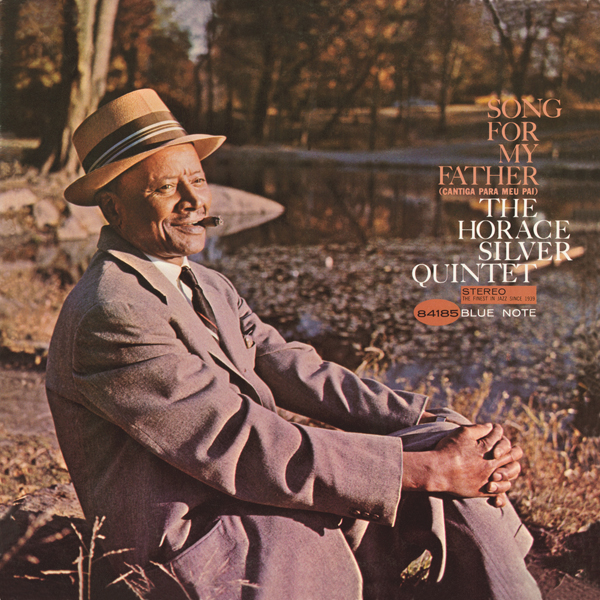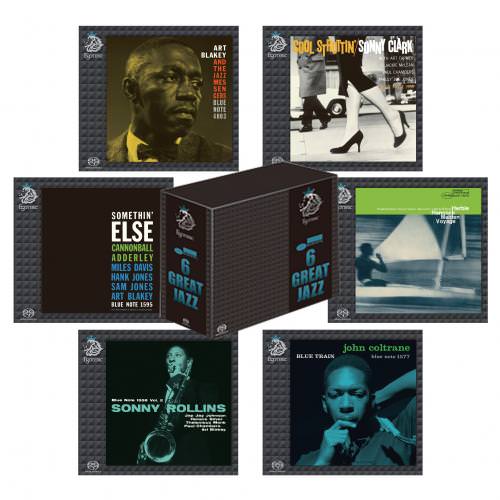
Horace Silver Quintet – Song For My Father (1965/2012)
FLAC (tracks) 24 bit/192kHz | Time – 42:23 minutes | 1,53 GB | Genre: Jazz
Official Digital Download – Source: HDTracks | © Blue Note Records
Recorded: October 31, 1963 (#3, 6); October 26, 1964 (#1, 2, 4, 5) at the Van Gelder Studio, Englewood Cliffs, NJ.
High Resolution Mastering by Alan Yoshida and Robin Lynn at Blanche DuBois, April 2012.
“In preparing these hi def remasters, we were very conscientious about maintaining the feel of the original releases while adding a previously unattainable transparency and depth. It now sounds like you’ve set up your chaise lounge right in the middle of Rudy Van Gelder’s studio!” -Blue Note President, Don Was.
Song for My Father was a milestone recording in the illustrious career of jazz pianist Horace Silver. Recorded through two sessions, a year apart, the album boasts an impressive line-up featuring Silver’s classic band and his newly formed quintet. The charismatic jazz man delivered his sophisticated balance of lively rhythms with complex harmonies. The title track, one of his most well known compositions, has transformed into a jazz standard and heavily influenced Steely Dan’s biggest pop hit, “Rikki Don’t Lose That Number.” This essential recording remains one of Blue Noteís greatest hard bop releases, and was inducted into the Grammy Hall of Fame in 1999.
One of Blue Note’s greatest mainstream hard bop dates, Song for My Father is Horace Silver’s signature LP and the peak of a discography already studded with classics. Silver was always a master at balancing jumping rhythms with complex harmonies for a unique blend of earthiness and sophistication, and Song for My Father has perhaps the most sophisticated air of all his albums. Part of the reason is the faintly exotic tint that comes from Silver’s flowering fascination with rhythms and modes from overseas — the bossa nova beat of the classic “Song for My Father,” for example, or the Eastern-flavored theme of “Calcutta Cutie,” or the tropical-sounding rhythms of “Que Pasa?” Subtle touches like these alter Silver’s core sound just enough to bring out its hidden class, which is why the album has become such a favorite source of upscale ambience. Song for My Father was actually far less focused in its origins than the typical Silver project; it dates from the period when Silver was disbanding his classic quintet and assembling a new group, and it features performances from both bands. Still, it hangs together remarkably well, and Silver’s writing is at its tightest and catchiest. The title cut became Silver’s best-known composition, partly because it provided the musical basis for jazz-rock group Steely Dan’s biggest pop hit “Rikki Don’t Lose That Number.” Another hard bop standard is introduced here in the lone non-Silver tune, tenor saxophonist Joe Henderson’s “The Kicker,” covered often for the challenge of its stuttering phrases and intricate rhythms. Yet somehow it comes off as warm and inviting as the rest of the album, which is necessary for all jazz collections — mainstream hard bop rarely comes as good as Song for My Father. -Steve Huey
Tracklist:
1 Song For My Father 7:18
2 The Natives Are Restless Tonight 6:11
3 Calcutta Cutie 8:31
4 Que Pasa 7:48
5 The Kicker 5:27
6 Lonely Woman 7:03
Personnel:
Tracks 1, 2, 4, 5:
Horace Silver – piano
Carmell Jones – trumpet
Joe Henderson – tenor saxophone
Teddy Smith – bass
Roger Humphries – drums
Tracks 3, 6:
Horace Silver – piano
Blue Mitchell – trumpet
Junior Cook – tenor saxophone
Gene Taylor – bass
Roy Brooks – drums
Download:
mqs.linkHraceSilverSngFrMyFather19642012HDTracks.part1.rar
mqs.linkHraceSilverSngFrMyFather19642012HDTracks.part2.rar




















![Horace Silver Quintet - Song For My Father (1965/2012) [HDTracks FLAC 24bit/192kHz] Horace Silver Quintet - Song For My Father (1965/2012) [HDTracks FLAC 24bit/192kHz]](https://getimg.link/images/imgimgimg/uploads/2016/03/BBn5bs0.jpg)
![Kenny Burrell - Midnight Blue (1963/2012) [HDTracks FLAC 24bit/96kHz] Kenny Burrell - Midnight Blue (1963/2012) [HDTracks FLAC 24bit/96kHz]](https://getimg.link/images/imgimgimg/uploads/2017/02/qidAx.jpg)
![Herbie Hancock - Maiden Voyage (1965/2012) [HDTracks 24bit/192kHz] Herbie Hancock - Maiden Voyage (1965/2012) [HDTracks 24bit/192kHz]](https://getimg.link/images/imgimgimg/uploads/2015/11/udUYw6I.jpg)
![Freddie Hubbard - Hub-Tones (1962/2013) [HDTracks 24bit/192kHz] Freddie Hubbard - Hub-Tones (1962/2013) [HDTracks 24bit/192kHz]](https://getimg.link/images/imgimgimg/uploads/2015/11/GJObm1q.jpg)
![Jackie McLean - One Step Beyond (1963/2014) [HDTracks FLAC 24bit/192kHz] Jackie McLean - One Step Beyond (1963/2014) [HDTracks FLAC 24bit/192kHz]](https://getimg.link/images/imgimgimg/uploads/2017/06/Bf6Fb8N.jpg)
![Scott DuBois - Autumn Wind (2017) [FLAC 24bit/96kHz] Scott DuBois - Autumn Wind (2017) [FLAC 24bit/96kHz]](https://getimg.link/images/imgimgimg/uploads/2019/06/R8l6mZ1.jpg)
![John Coltrane - Blue Train (1957/2012) [HDTracks FLAC 24bit/192kHz] John Coltrane - Blue Train (1957/2012) [HDTracks FLAC 24bit/192kHz]](https://getimg.link/images/imgimgimg/uploads/2016/06/CQ7V2bj.jpg)
![Horace Silver - Blowin’ The Blues Away (1959/2013) [HDTracks FLAC 24bit/192kHz] Horace Silver - Blowin’ The Blues Away (1959/2013) [HDTracks FLAC 24bit/192kHz]](https://getimg.link/images/imgimgimg/uploads/2016/03/zEzNHCr.jpg)
![Horace Silver - Blowin’ The Blues Away (1959/2013) [HDTracks FLAC 24bit/192kHz] Horace Silver - Blowin’ The Blues Away (1959/2013) [HDTracks FLAC 24bit/192kHz]](https://getimg.link/images/imgimgimg/uploads/2016/05/zEzNHCr.jpg)
![Wayne Shorter - Speak No Evil (1964/2012) [HDTracks FLAC 24bit/192kHz] Wayne Shorter - Speak No Evil (1964/2012) [HDTracks FLAC 24bit/192kHz]](https://getimg.link/images/imgimgimg/uploads/2016/12/UwH3lUm.jpg)
![Lee Morgan - The Sidewinder (1963/2012) [HDTracks FLAC 24bit/192kHz] Lee Morgan - The Sidewinder (1963/2012) [HDTracks FLAC 24bit/192kHz]](https://getimg.link/images/imgimgimg/uploads/2017/08/3T0a1Mj.jpg)


![Hank Mobley - Soul Station (1960/2013) [HDTracks FLAC 24bit/192kHz] Hank Mobley - Soul Station (1960/2013) [HDTracks FLAC 24bit/192kHz]](https://getimg.link/images/imgimgimg/uploads/2016/01/4Ymn9K2.jpg)
![Larry Young - Unity (1965/2012) [HDTracks FLAC 24bit/192kHz] Larry Young - Unity (1965/2012) [HDTracks FLAC 24bit/192kHz]](https://getimg.link/images/imgimgimg/uploads/2017/01/3JUZxSu.jpg)